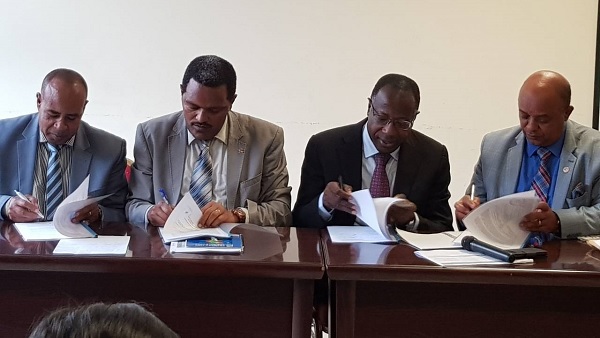
ADDIS ABABA (The Global Fund: Ethiopia CCM)–Ethiopia Country Coordinating Mechanism (CCM/E) in collaboration with the principal recipients (PRs), Federal Ministry of Health (FMoH) and Federal HIV/AIDS Prevention and Control Office (FHAPCO), launched new Global Fund grants for HIV/AIDS, Tuberculosis, malaria and resilient and sustainable system for health (RSSH) for 2018-2021 implementation period.
Two-day launching workshop was organized to introduce the goals, objectives, what major strategies are, implementation and reporting requirements and expectations of these grants with regional health bureaus, federal agencies, other implementers and partners, two-days Global Fund new grants launching workshop was conducted on January 23rd and 24th 2018 at Ethiopian Public Health Institute (EPHI). Higher officials from FMoH and agency heads, CCM/E members, Global Fund Secretariat, RHB heads, Disease prevention and control heads at FMoH/HAPCO and RHBs, Regional HAPCO heads, Program coordinator at FMoH/HAPCO and RHBs, experts from FMoH directorates and agencies, finance and grant management units from FMoH/HAPCO and RHBs, relevant stakeholders were represented in the launching workshop.
At the end of 2016, Ethiopia received allocation letter from the Global Fund on the fund allocation for the fight against the three diseases and building resilient and sustainable system for health (RSSH). In 2017, Ethiopia submitted three funding requests to for TB/HIV, malaria and RSSH for January 2018 – June 2021 Implementation Period and all were reviewed and approved by independent Technical Review Panel (TRP) and Grant Approval Committee (GAC). A total of USD379 million was allocated and approved for funding for HIV (US$194 million), TB (US$46 million) and malaria (US$112 million) programs and RSSH (27 million).
Using these Global Fund grants, the Federal Ministry of Health (FMoH) and Federal HIV/AIDS Prevention and Control Office (FHAPCO) in collaboration with regional health bureaus, federal agencies and partners plan to achieve the following against the three disease and RSSH during the 2018-2021 implementation period:
- By implementing high impact prevention interventions, intensifying Targeted HIV testing and counseling service, attaining virtual elimination of mother to child transmission (MTCT) of HIV and optimizing and sustaining quality care and treatment, the HIV/AIDS program aims to avert 70,000 – 80,000 new infection by 2020 and save 500,000-550,000 lives by 2020.
- Through strengthening TB care and prevention, MDR-TB case finding and treatment, TB/HIV collaborative activities and advocacy, communication and social mobilization interventions, the National TB program aims to reduce TB incidence to 161/100,000 population by 2021 from a 2015 baseline of 192, reduce mortality to 18/100,000 population by the end of 2021 from a 2015 – 26 baseline and diagnosis and treat a total of 4,855 DR-TB cases by 2021.
- Through strengthening vector control and case management interventions, improving community engagement and intensifying active surveillance, the National Malaria Program aims to achieve near zero malaria deaths (<1 confirmed deaths/100,000 population at risk), to reduce malaria cases by 75% from baseline of 2013 and eliminate malaria in 239 woredas by end of 2020.
- The Ministry also plan to improve human resource capacity, strengthening supply chain management system, health management information system, laboratory system and financial management and financial reporting through the support of the RSSH grants from government, Global Fund and other development partners.
These Global Fund grants were officially launched in presence of H.E. Dr. Kebede Worku, State Minister of Health and CCM-Ethiopia Chairperson, Dr. Shallo Daba, Director General of FHAPCO, Dr. Meshesha Shewarega, Executive Director of CCRDA and CCMM-Ethiopia Vice-chairperson and Mr. Linden Morrison, Head of Grant Management Unit/High Impact Africa II/Global Fund.
Source: The Global Fund: Ethiopia CCM
